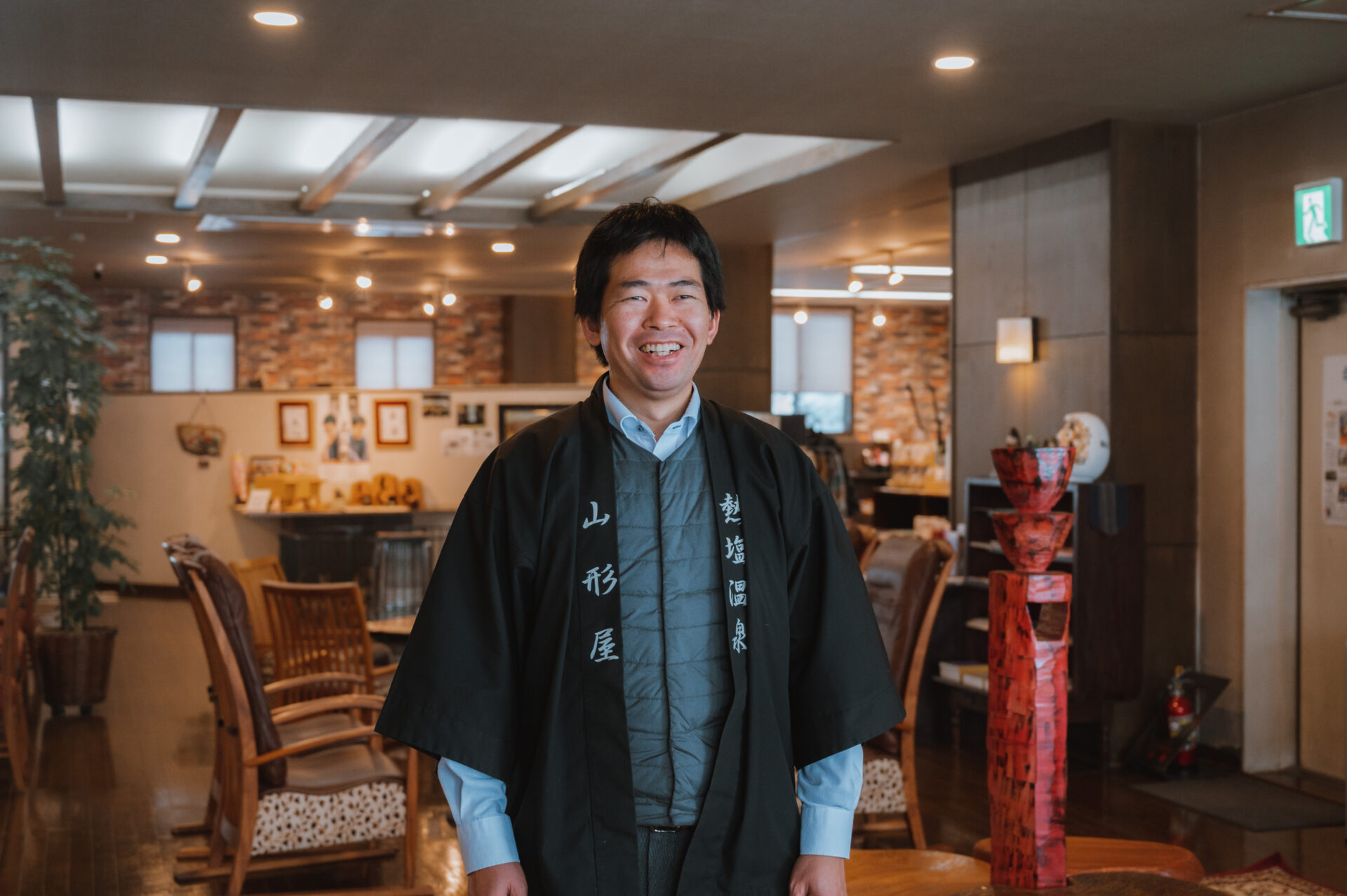
A Unique Inn Nestled in the Mountains Offering Premier Countryside Experiences

瓜生真吾
Shingo Uryu
Kitakata [Fukushima]
Shingo Uryu
Originally from Tokyo, Uryu Shingo moved to Kitakata as an adopted son-in-law in 2015 after seven years as a salaried worker. At "Atsushio Onsen Yamagataya," which boasts creative cuisine that has been continuing for about 650 years, Uryu is working on inheriting the charm of Kitakata and solving regional issues. Yamagataya is renowned for its seasonal landscapes, effective hot springs, and delicious local ingredients.
In Kitakata, located in the northwestern part of Fukushima Prefecture and surrounded by magnificent nature, one can fully enjoy the changes of the four seasons. We asked Mr. Uryu about his contributions to Yamagataya, marked by tradition and history, and his aspirations for the future.
Blending into Kitakata with a “Let’s Just Try It” Spirit
Uryu Shingo, originally from Tokyo, became an adopted son-in-law and moved to Kitakata in 2015. Before embarking on his life at Yamagataya, Uryu was a salaried worker. “As a salaried worker, I was dedicated to my job in front of me, but I didn’t have specific goals beyond that, leading to a lack of fulfillment… I’ve always preferred to think and act on my own, finding environments where responsibility follows to be more engaging,” he reflects. Upon arriving in Kitakata, his days were filled with thinking and acting. “My initial priorities were getting accustomed to the community and the job. I was a complete novice in the industry, unfamiliar with the jargon, culture, and history.”
His first step was to connect with local people through the Kitakata Young Entrepreneurs Group. “Back then, my approach was just to try things out. Instead of staying ignorant, I aimed to clear up uncertainties by trying,” Uryu recalls. While valuing the connections made through the Kitakata Young Entrepreneurs Group, he also engaged in activities like chess and river fishing, deepening his interactions in various places. “It was about communicating with stakeholders, locals, and the elderly, trying to blend into Kitakata,” Uryu says, looking back.
“Kitakata people describe themselves as shy, embarrassed, or stubborn, but from my perspective, that’s not quite the case (laughs). Well, the stubbornness might be true.” Being from outside the area allowed him to appreciate the local charms with a different sensitivity.
“The elite culture and spirit that have been passed down through generations are often preserved in the countryside. In Kitakata, this includes brewing culture, like sake making, and lacquerware,” Uryu explains.
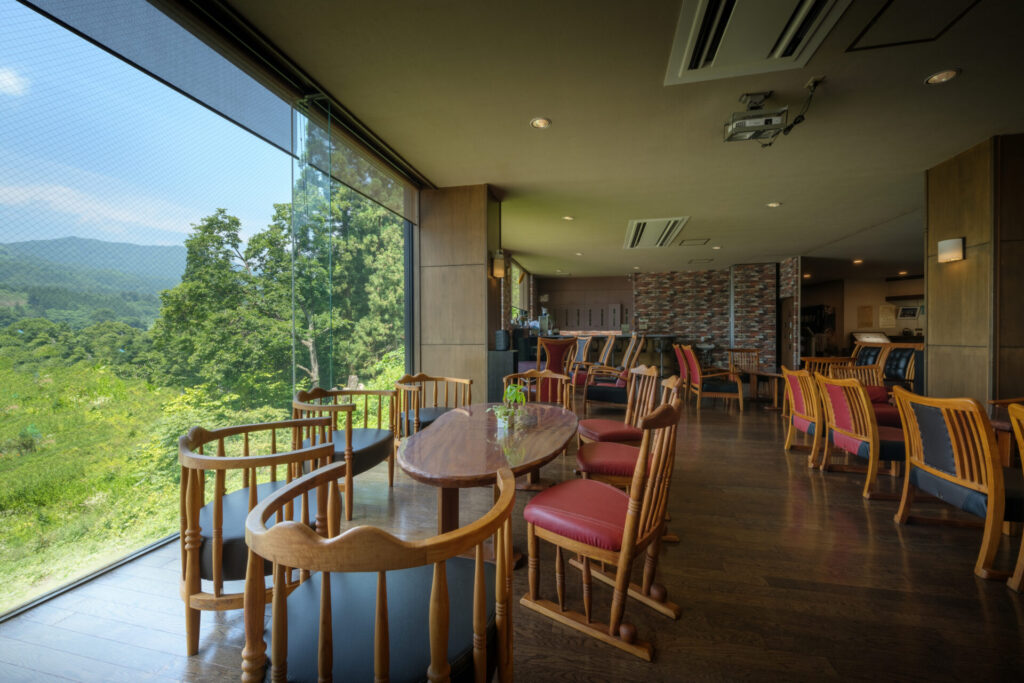
Culture and Spirit Thrive in the Countryside
“Atsushio Onsen Yamagataya” in Kitakata City, with a history dating back about 650 years, offers stunning seasonal views, a historic hot spring, and delicious ingredients. The inn, known as Yamagataya since the opening of Atsushio Onsen, was also the family home of Uryu Iwako, known as “Japan’s Nightingale,” who laid the foundations of modern Japanese social welfare.
The characteristic of Atsushio hot springs is its “heat and high salt content.” “Going to the sea makes you thirsty. That’s because the body tries to equalize internal and external salt levels, naturally absorbing the spring water. The crystalline form contained in the hot springs clogs the sweat glands, warming the body and making it easier to sweat, which is why it’s known as a fertile hot spring,” explains Uryu Shingo, Executive Managing Director at Yamagataya. The area was once believed to be under the sea, containing rock salt, making the “salty” hot spring in the mountains a rare phenomenon.
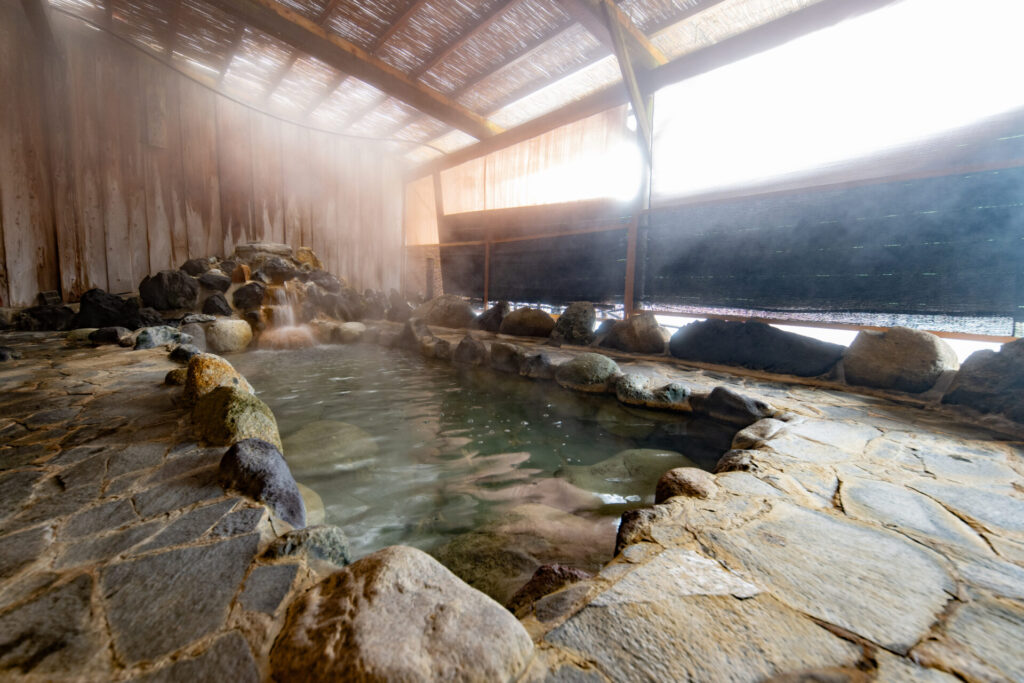
Creative Cuisine Changing Monthly Based on the “Shin-Do-Fuji” Concept
One of the pleasures of staying at a hot spring ryokan is the cuisine. Given that many guests stay for extended periods for spa treatment, Yamagataya offers creative dishes to enjoy the variety. The key principle is “Shin-Do-Fuji,” originally a Buddhist term meaning “People in Japan live healthily by consuming local produce. We incorporate this into our cuisine, using vegetables from Atsushio Kanou Town and other ingredients within a 30km radius, mainly from Kitakata City, except for fresh fish. We believe in providing our guests with something rooted deeply in the land, and we express that through our cuisine,” says Uryu.
Originally a spa resort, guests often stay for two to three nights, up to a week, so there’s a commitment to offering a variety of meals, changing monthly. “The menu has been shaped by internal and external feedback. Regarding the cuisine, we think it’s beneficial to have both inside and outside perspectives, so we hold bimonthly dinner parties with local business owners to gather feedback on our dishes. We’re close, so there’s no need to hold back on saying if something’s good or not (laughs). We might use Kitakata ramen or change about half of the menu monthly, leading to entirely different dishes every two or three months. There are no standard dishes. While keeping delicious items could create high-quality offerings, change boosts the motivation of the chefs, so we deliberately don’t do it.” Each visit brings fresh discoveries, enticing guests to return.
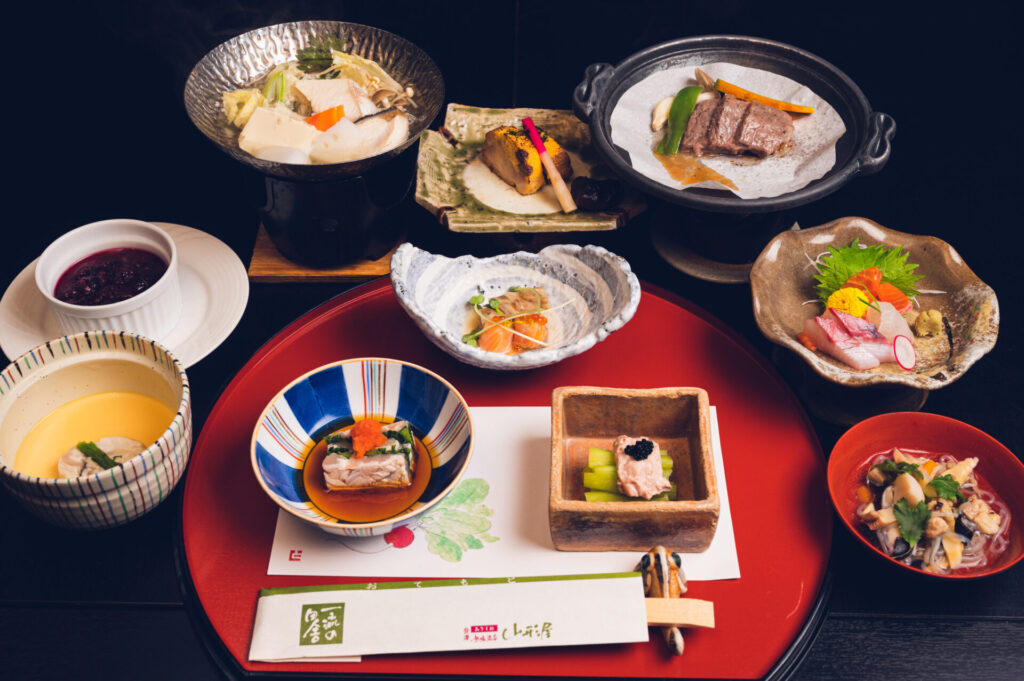
“Through the multi-pairing event※ planned in 2023, I realized that not only the taste but also the story behind it is important. The taste differs whether you hear the backstory of Mr. Sato’s sake from Yamatogawa Shuzo or not,” he shares.
“Regarding things that have always been taken for granted but felt odd, I didn’t necessarily see them as normal, so I’ve been changing them bit by bit,” and now Yamagataya is advancing digitalization with smart check-ins and tablet use.
※The multi-pairing event: A plan to enjoy a piece of Yamagataya’s signature cuisine with nine types of sake and Aizu lacquerware.
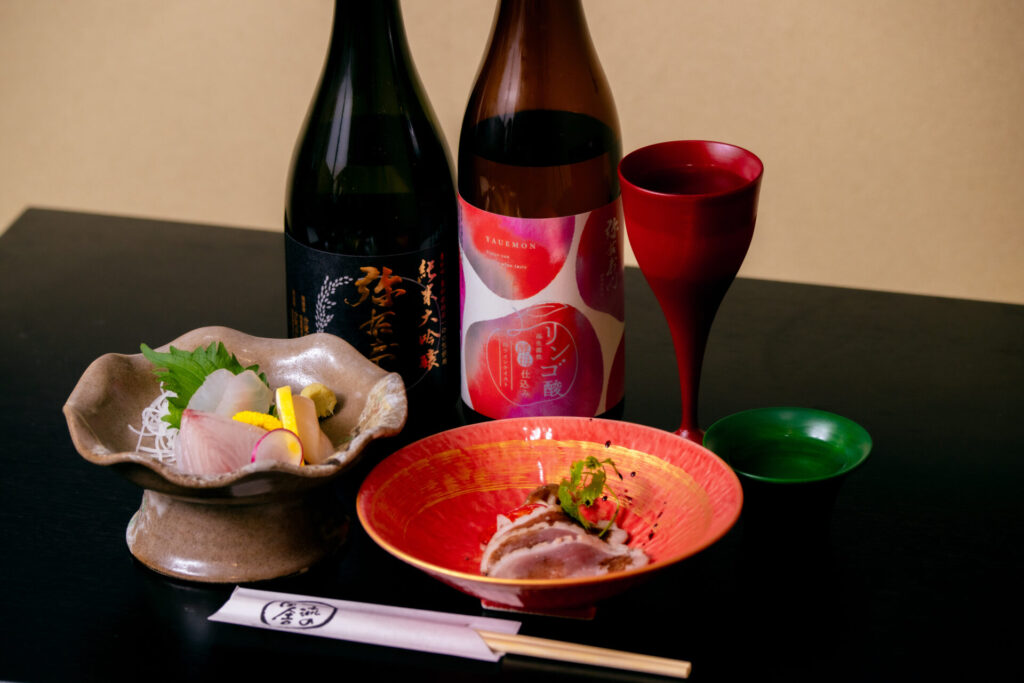
“Charcoal Barden” for Maximizing Immunity
Yamagataya features “Charcoal Barden,” a low-temperature charcoal floor sauna developed in-house about 20 years ago, the first of its kind in Japan. “Atsushio Onsen doesn’t have the typical tourist or hot spring town vibe, so we’ve prepared several ways for guests to enjoy their time indoors. We’ve been offering Charcoal Barden for 20 years.” Charcoal emits negative ions and has a relaxing effect, synergizing with the hot springs to maximize the body’s immunity. “At about 40°C, it’s a low-temperature sauna where guests can relax for an extended time. We hope you enjoy this soothing time. After warming up, please enjoy our sake-tasting corner.”
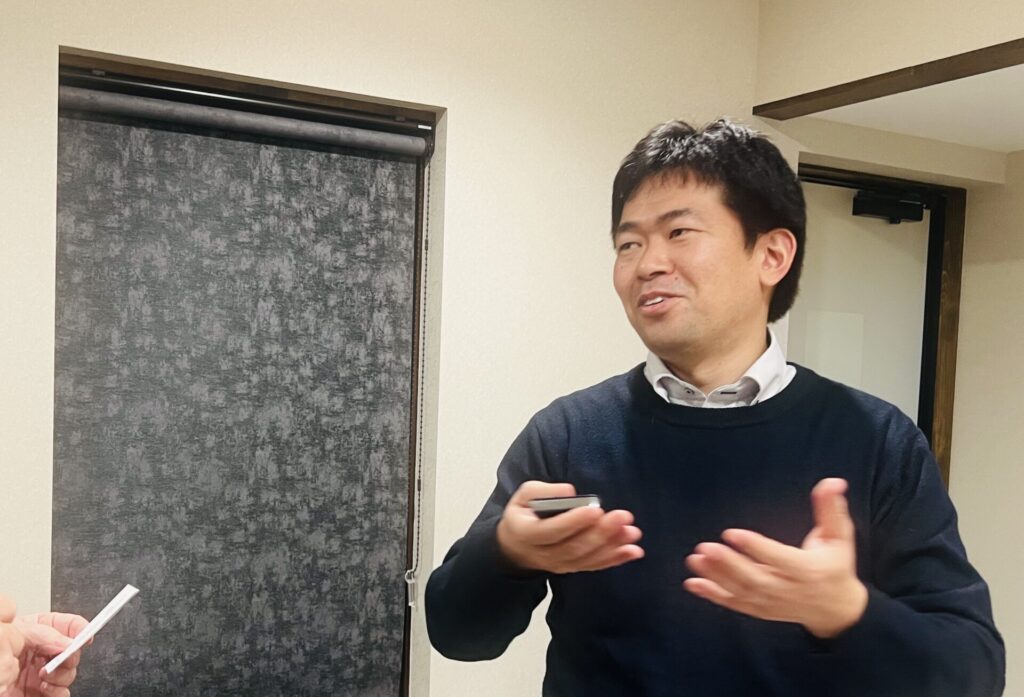
Involvement in Addressing Regional Issues
Uryu, who is currently raising children, has deep thoughts about the future of Kitakata City. “I don’t necessarily link my type of business to the solution of local issues,” he says. However, I have to work on solving the issues of the region in my work, knowing that it will feed back to my own business in turn.” he says. “I’m happy to be raising children in this land, supported by the rich nature and neighbors. Yet, it’s true we face various challenges like declining birth rates, aging population, vacant houses, and abandoned agricultural land. Next year, my son’s school will have only one student per grade. There are talks of consolidation, but depopulation is a serious issue here, more so than in other places. It’s not just the clear numbers of declining population; at the ground level, the community itself is disappearing. The places where children play or learn are gradually diminishing, and there’s no clear solution yet. The surroundings are deep mountains. How we utilize this nature is the question. The scenery essential for “premium countryside” is maintained by human intervention. To further sharpen this concept, I want to be involved in addressing regional issues,” he expresses his determination.
